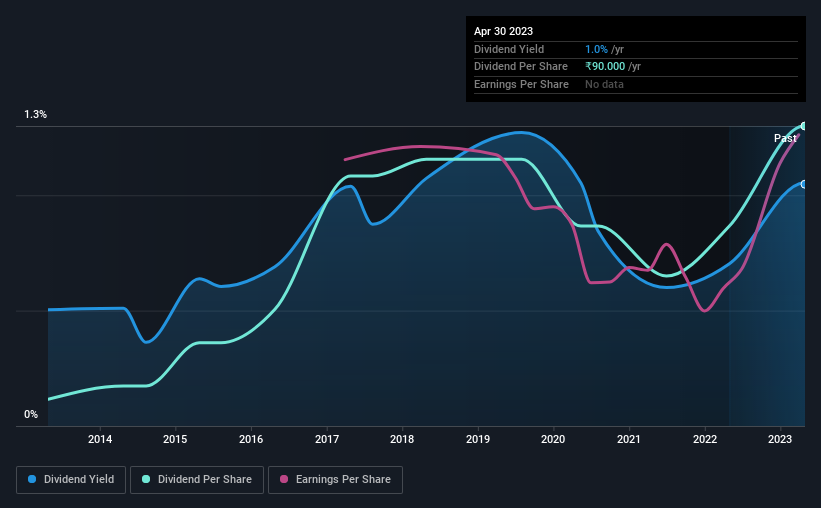Maruti Suzuki India (NSE:MARUTI) Has Announced That It Will Be Increasing Its Dividend To ₹90.00

Maruti Suzuki India Limited (NSE:MARUTI) has announced that it will be increasing its dividend from last year's comparable payment on the 6th of September to ₹90.00. Although the dividend is now higher, the yield is only 1.0%, which is below the industry average.
View our latest analysis for Maruti Suzuki India
Maruti Suzuki India's Payment Has Solid Earnings Coverage
It would be nice for the yield to be higher, but we should also check if higher levels of dividend payment would be sustainable. But before making this announcement, Maruti Suzuki India's earnings quite easily covered the dividend. The business is earning enough to make the dividend feasible, but the cash payout ratio of 94% shows that most of the cash is going back to the shareholders, which could constrain growth prospects going forward.
Over the next year, EPS could expand by 0.8% if recent trends continue. Assuming the dividend continues along recent trends, we think the payout ratio could be 32% by next year, which is in a pretty sustainable range.

Dividend Volatility
The company's dividend history has been marked by instability, with at least one cut in the last 10 years. The annual payment during the last 10 years was ₹8.00 in 2013, and the most recent fiscal year payment was ₹90.00. This works out to be a compound annual growth rate (CAGR) of approximately 27% a year over that time. It is great to see strong growth in the dividend payments, but cuts are concerning as it may indicate the payout policy is too ambitious.
Maruti Suzuki India May Find It Hard To Grow The Dividend
Given that the dividend has been cut in the past, we need to check if earnings are growing and if that might lead to stronger dividends in the future. Unfortunately, Maruti Suzuki India's earnings per share has been essentially flat over the past five years, which means the dividend may not be increased each year. Earnings growth is slow, but on the plus side, the dividend payout ratio is low and dividends could grow faster than earnings, if the company decides to increase its payout ratio.
Our Thoughts On Maruti Suzuki India's Dividend
Overall, this is probably not a great income stock, even though the dividend is being raised at the moment. The low payout ratio is a redeeming feature, but generally we are not too happy with the payments Maruti Suzuki India has been making. We would be a touch cautious of relying on this stock primarily for the dividend income.
Companies possessing a stable dividend policy will likely enjoy greater investor interest than those suffering from a more inconsistent approach. Still, investors need to consider a host of other factors, apart from dividend payments, when analysing a company. Case in point: We've spotted 2 warning signs for Maruti Suzuki India (of which 1 can't be ignored!) you should know about. Is Maruti Suzuki India not quite the opportunity you were looking for? Why not check out our selection of top dividend stocks.
New: Manage All Your Stock Portfolios in One Place
We've created the ultimate portfolio companion for stock investors, and it's free.
• Connect an unlimited number of Portfolios and see your total in one currency
• Be alerted to new Warning Signs or Risks via email or mobile
• Track the Fair Value of your stocks
Have feedback on this article? Concerned about the content? Get in touch with us directly. Alternatively, email editorial-team (at) simplywallst.com.
This article by Simply Wall St is general in nature. We provide commentary based on historical data and analyst forecasts only using an unbiased methodology and our articles are not intended to be financial advice. It does not constitute a recommendation to buy or sell any stock, and does not take account of your objectives, or your financial situation. We aim to bring you long-term focused analysis driven by fundamental data. Note that our analysis may not factor in the latest price-sensitive company announcements or qualitative material. Simply Wall St has no position in any stocks mentioned.
About NSEI:MARUTI
Maruti Suzuki India
Engages in the manufacture, purchase, and sale of motor vehicles, components, and spare parts primarily in India.
Excellent balance sheet average dividend payer.


